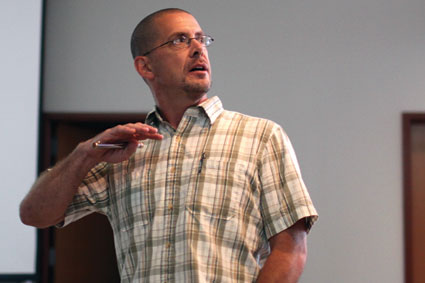 When Professor Eric Wetzel was named Treves Professor of Biology in October, Dean of the College Gary Phillips said, “He exemplifies the standard of the Treves chair holder from Willis Johnson’s day forward: an inspiring and engaged undergraduate teacher; a leader of the biological sciences; and a steadfastly engaged researcher.”
When Professor Eric Wetzel was named Treves Professor of Biology in October, Dean of the College Gary Phillips said, “He exemplifies the standard of the Treves chair holder from Willis Johnson’s day forward: an inspiring and engaged undergraduate teacher; a leader of the biological sciences; and a steadfastly engaged researcher.”
President Pat White praised another aspect of Wetzel’s work—his efforts to create a global health initiative at Wabash. Wetzel spent his sabbatical in Peru studying parasites and disease in that country, and working to build a program in global health so that faculty and students might be able to examine through their different disciplinary lenses health problems common to many regions of the world.
“He has come away from his sabbatical research in Peru with a new passion for global health issues,” White said. “As he involves students in his research and work there, he will help them change their lives as he has transformed his by the experience.”
The excerpt below from the final blog entry written during his sabbatical offers a glimpse into that transformation. As previous Treves Professor David Krohne alerted students to the plight of the natural world, Wetzel will turn their gaze to the suffering of others and the very achievable things Wabash students can do—through research and service—toward alleviating that.
“The issue of living humanely is something we don’t talk about enough,” Wetzel told alumni gathered during Homecoming for the Healthcare Professionals Reunion. “My goal isn’t to get more students into medical school; it’s to disturb their lives.”
April 30, 2010
I was visiting an indigenous rainforest community named Kawana-Sisa, outside the city of Tarapoto, Peru. I was meeting with leaders of this community to hear about their health and to investigate the kinds of work in which Wabash could become involved.
I can assure you from observation that the people here struggle with a variety of parasitic diseases.
Various leaders were speaking about their lives—how their health and the health of their children are their biggest concerns. They depend almost exclusively on traditional botanical remedies for various ailments, including parasitic infections, but realize that they’re not enough. This community has no running water, no sanitation system, no specific knowledge about the organisms infecting them.
Their lives are difficult.
A woman among the community leaders spoke passionately and with great eloquence about how her children have been denied care at the hospital that is nearest to them: “We were told our children were not sick enough.” I heard their anger and frustration with the national and regional political systems with regard to their health and education and how they feel totally excluded. I heard these wonderful folks talk about their beautiful community and about their families. We laughed and shared a meal.
But the voice that I can still hear is that of one of the community elders: “I am here to represent my community and to tell you that we need help—we are asking for your mercy.”
Their situation is not unique to the rainforest. Along the coast, in Lima, lie areas of extreme poverty. The people who reside there have the same aspirations for family, health, and work as you and me. I was privileged to hear an Andean woman in the mountains of Peru explain how clean running water has impacted her children and the opportunity she has for other activities.
“This has changed my life...” she said, and she was talking about being able to have a sink (located outside her home) with running water that she knew had been chlorinated and thus disinfected.
One could certainly ask, “So what?” We all know that hardship and suffering occur in lots of places around the world, including in our own lives at different points.
But what should our response be as a College? What can it be? How best should we lead the bright and full-of-potential young men who are our students into lives in which they learn to “act responsibly” and “to live humanely”?
I’m confident that having students wrestle with the big issues of global health is one of the ways we can do this. These issues require the input not only of biologists, but economists, political scientists, mathematicians, historians, ethicists, among others. Not only can this be a way for students, faculty, staff, and alumni to “act” and to “live” as individuals, but I believe that Wabash College as an institution can accomplish great things—in fact, merciful things.
 When Professor Eric Wetzel was named Treves Professor of Biology in October, Dean of the College Gary Phillips said, “He exemplifies the standard of the Treves chair holder from Willis Johnson’s day forward: an inspiring and engaged undergraduate teacher; a leader of the biological sciences; and a steadfastly engaged researcher.”
When Professor Eric Wetzel was named Treves Professor of Biology in October, Dean of the College Gary Phillips said, “He exemplifies the standard of the Treves chair holder from Willis Johnson’s day forward: an inspiring and engaged undergraduate teacher; a leader of the biological sciences; and a steadfastly engaged researcher.”